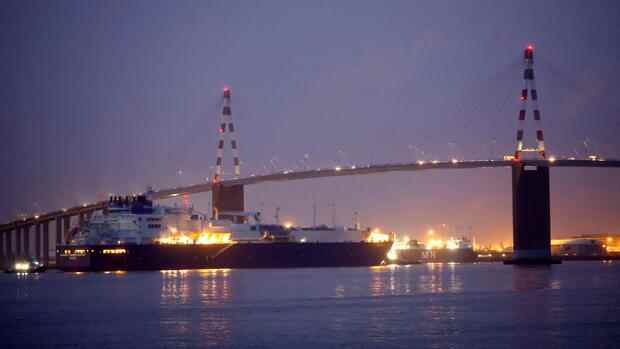Many traders have diverted their ships to Europe.
(Photo: REUTERS)
Many companies are beginning to feel fooled. For months there has been talk in the EU of capping electricity and gas prices. But when the energy ministers meet on Thursday, they will again not decide on this instrument. Several states are now threatening to let other gas laws fail unless a gas price cap is finally put in place.
If you ask representatives of the Commission why nothing is happening, they can give a full-length report on what has already been decided. It is then about savings obligations, storage requirements and market interventions. You have to be familiar with these debates to realize that a gas price cap is not included among all the measures.
That drives some lobbyists crazy. Companies from almost all sectors are suffering from the high prices, and some are withdrawing their investments from Europe. Within the EU, there are majorities in favor of a cap that would take the burden off companies’ shoulders.
But still it is not decided. The demand for it is older than the Ukraine war. Since then, the prices for gas and electricity have risen enormously and with them the frustration with the Commission.
Top jobs of the day
Find the best jobs now and
be notified by email.
The authority led by Ursula von der Leyen holds a key position in the complicated power structure in Brussels. Above all, the right of initiative makes them very powerful in the current situation: a proposal from the Commission is required for every law that is to apply across the EU. Neither Parliament nor the Member States can introduce their own legal text.
Who pays for the lid?
In terms of content, there are good arguments against a price cap. Once you start keeping prices artificially low, it will be difficult to get out of this situation. A lid can cost many billions every year. Who should pay for this? And how do you prevent the EU-subsidized electricity from flowing into Switzerland or Great Britain?
>> Read here: Gas storage in Germany: How high is the level currently?
Von der Leyen himself presented these problems as technical details in mid-October. Experts can hardly think of how to work around them. In addition, von der Leyen had forgotten the contradiction that reduced prices almost always lead to higher consumption – which one would like to avoid at all costs.
Christoph Herwartz, correspondent in the Handelsblatt office in Brussels, analyzes trends and conflicts, regulatory projects and strategic concepts from the inner workings of the EU. Because anyone interested in business needs to know what’s going on in Brussels. You can reach him at [email protected]
Commission officials keep pointing out these contradictions. Their current paper, which the energy ministers will discuss on Thursday, is expressly not a gas price cap. What they are proposing is said to be a “corrective mechanism” for the gas market.
The aim is to limit price increases when they appear unjustified – for example when the price of gas in Europe is suddenly significantly higher than what is paid elsewhere in the world.
A big distraction
In order not to cause too much damage with such an instrument, the officials in their proposal use more text to describe the safeguards than the market intervention itself.
The message is clear: if the measure even gives the impression that it throws the gas market out of balance, the EU Commission will pull the plug and have the market regulated again.
The market is complex and sensitive. The rise in prices has caused entire tanker fleets to set course for Europe. The Commission officials don’t want to be to blame if the ships turn back because someone is tampering with the prices. “In the best-case scenario, this tool will never be used,” says a senior Commission official of the new mechanism.
>> Read here: LNG tankers back up off the coast – Europe’s gas market is failing
The purpose of the proposal seems more to keep energy ministers busy so that they have less opportunity to demand a real gas price cap. “Kicking the can down the road” is the motto in Brussels when a topic is adjourned from one committee to the next: the can is kicked down the street without ever getting anywhere.
This is often a sign that this proposal is not of the highest priority. In this case it is pure intention. Again and again the heads of state and government decide that the Commission must do more. They then submit something to the energy ministers, who in turn have to report to their heads of government that what they want is not there.
It is unclear whether the Commission will get away with it again at the energy ministers’ meeting this Thursday. Belgium, Greece, Italy and Poland are threatening to block other energy laws unless the Commission finally caps gas prices.
More: LNG miracle on the German coast: This is how the construction of the floating terminals is progressing
